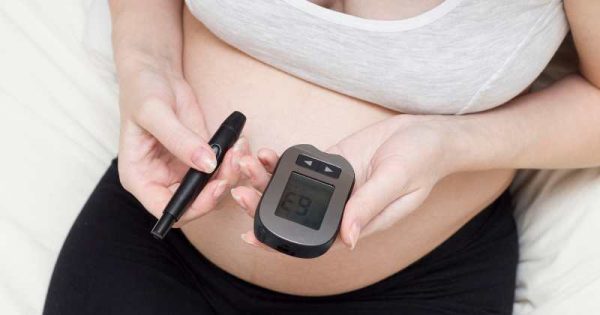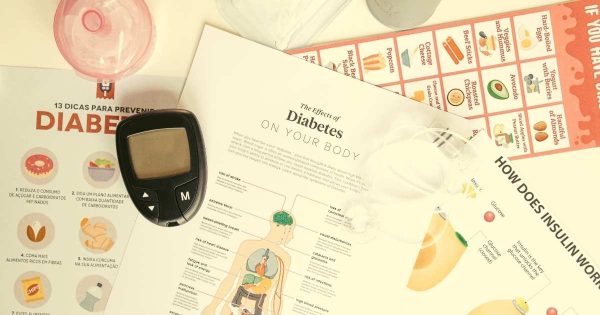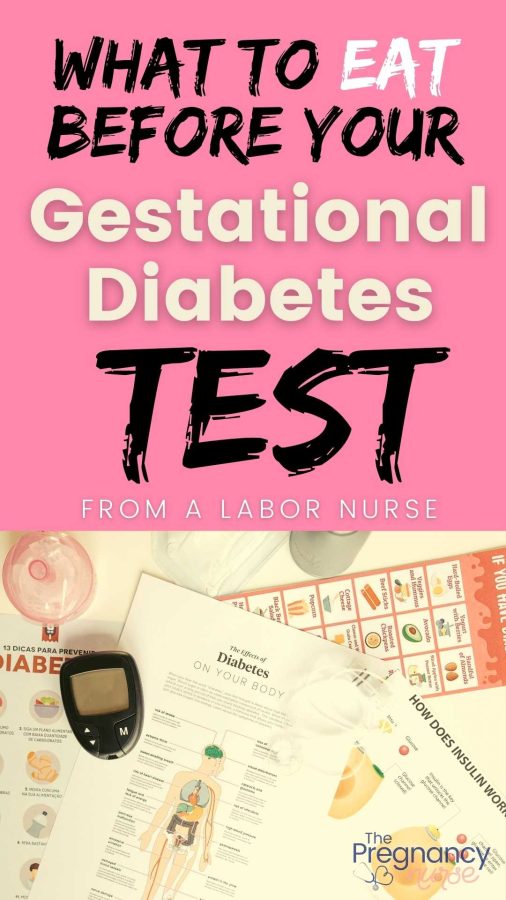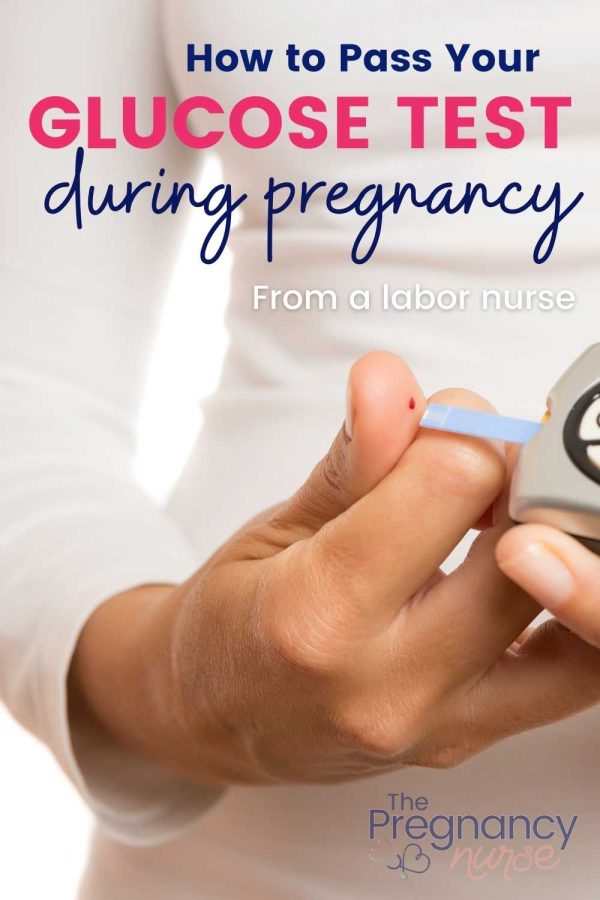📣 YOU are clearly getting prepared for pregnancy, birth & beyond — but do you wish your partner was more involved (looking for a teammate rather than just a cheerleader)? Couples love THIS! 💛🧡💚
The gestational diabetes test is most often offered towards the end of your second trimester (but can be given sooner if indicated). This glucose screening test is SO important, but is sometimes mis-understood by people. Today we’re going to give you an overview of the test, how to pass it, and what to do if you don’t pass — because it’s SO important for both you and baby’s health.

But first off, how do I know so much about this test?
Beyond taking the test with my own 3 pregnancies, I have been a nurse since 1997 and I have 20 years of OB nursing experience (including helping in a gestational diabetes clinic), I am also the curly head behind Pulling Curls and The Online Prenatal Class for Couples. 🩺 I get that this test can be scary and there’s a lot to know about it — so I’m glad an expert like me can help you out!
Oh, and if you’re close to taking this test, get one of these too {what a great way to spend your hour waiting on the test}
I also have a video on this topic:
What is Gestational Diabetes?
Gestational diabetes is a type of diabetes that develops during pregnancy. It is a condition where a woman’s blood sugar levels become too high during pregnancy due to hormonal changes that affect insulin production and utilization.
Note: It acts the same as “regular” diabetes, but is caused because of pregnancy so most often goes away after baby is born.
Gestational diabetes can also occur if the body cannot produce enough insulin to meet the increased demands during pregnancy. Similar to type 2 diabetes, gestational diabetes can result in high blood sugar levels that can have adverse effects on both the mother and the baby.
Basically, what happens is your cells need more insulin to allow sugar in because of the hormones/changes in your body/cells during pregnancy.
Your body just can’t produce enough insulin to do that. This can lead to too much sugar in the blood that can be hard for you and baby. It can also lead to larger variations in blood sugar (higher highs, and lower lows) that can leave mom feeling poorly (and are not good for baby). So, there are some pretty serious risks.
What Are the Risks of Gestational Diabetes?
If left untreated or unmanaged, it can lead to complications such as macrosomia (a larger than average baby), preeclampsia, preterm birth, and an increased risk of developing type 2 diabetes later in life, and can lead to stillbirth if not controlled
A large baby can have risks like shoulder dystocia, or being to big to go through your pelvis (leading to a cesarean section). Baby can also have issues keeping their blood sugar up on their own when they are born.
The good news is that with early diagnosis and proper management through a combination of diet, exercise, and sometimes medication, women with gestational diabetes can have a safe and healthy pregnancy.
Regular monitoring of blood sugar levels, frequent medical check-ups, and close collaboration between the healthcare team and the expectant mother are crucial in managing gestational diabetes effectively.
If you manage your diabetes well the risks aren’t high at all — it is as if your baby and body is living without diabetes. So, that’s good news. If your blood sugar isn’t well-managed (and sometimes this has nothing to do with you, sometimes your body just has a hard time with the changes) they may induce you early (it’s one of the reasons they induce at 37 weeks)
Have you checked a birth class off your to do list✅? I have a few I recommend:
❤️ Best class for couples {per BabyList}
👩💻 Best class available on demand
⚡ Best class JUST for pain management
👶 Best Postpartum-Only Prep
❤️🧡💛💚💙💜 My favorite class is here.
Now is the time to get started!
When will I be tested for gestational diabetes?
Gestational diabetes is a type of diabetes that develops during pregnancy. The test for gestational diabetes is usually conducted between 24 to 28 weeks of pregnancy. This is the ideal time to screen for the condition as it allows healthcare professionals to identify whether a woman has developed gestational diabetes or not.
The reason why this test is performed around 24-28 weeks of pregnancy is because this is the time when the placenta begins to produce more hormones that can interfere with the body’s insulin levels.
Also, this time frame also gives enough time for intervention and management in case the woman is diagnosed with gestational diabetes. This study had some interesting information on why they choose 24-28 weeks to administer the test.
However, if you have risks factors like a previously large baby, previously having gestational diabetes, or a strong family history of diabetes, they may encourage you to get tested earlier. I was tested at about 10 weeks with my third pregnancy (which I passed) because I’d previously had a 9 pound baby, my grandpa has diabetes, and I am also overweight.
It is important to note that even if a woman has no risk factors for gestational diabetes, there is still a chance of developing the condition. Therefore, it is recommended that all pregnant women undergo the test for gestational diabetes to ensure early detection and appropriate management if needed. This study showed that there was much more harm in not taking the test than taking it, and did recommend it for all pregnant individuals.

What causes gestational diabetes?
Gestational diabetes is a temporary form of diabetes that occurs during pregnancy and affects about 10% of pregnant women.
It is believed to be caused by hormonal changes that make the body less responsive to insulin. Insulin is a hormone that helps regulate blood glucose levels, and when the body becomes resistant to its effects, blood glucose levels can become higher than normal. The high blood glucose levels characteristic of gestational diabetes can affect both the mother and the developing baby.
Women who develop gestational diabetes have a higher risk of developing type 2 diabetes later in life. Pregnancy mimics some of the ways your cells will act in 20 or so years, so it can be a wake-up call that some lifestyle changes can possibly help prevent getting type two diabetes at an older age.
While you’re here: I have a safe-eating guide for pregnancy:
What is the oral glucose tolerance test (OGTT)?
Note: This test goes by a few names:
- 1-hour glucose test or 3-hour glucose test
- Glucose screening
- Glucose Challenge test
- Glucose tolerance test (sometimes used for the 3-hour test)
- Pregnancy glucose test
- Gestational Diabetes Test
- Orange drink test (my personal favorite)
The oral glucose tolerance test is a medical procedure used to assess the body’s ability to regulate blood glucose levels. It is commonly used to diagnose gestational diabetes in pregnant women, as well as to evaluate individuals suspected of having diabetes or pre-diabetes. Honestly, I only hear of it being used in pregnant people anymore… they have other tests for individuals who aren’t pregnant.
Why this glucose test instead of A1C (which is what they use most-frequently in the general population)?
It’s because this is a very small period of time when you would have blood sugar issues. The A1C measures blood glucose control over a longer period. By the time we were able to accurately test and find a problem with the A1C you’d be almost to your due date and would have had no managment. Hence, this annoying test.
Some patients are asked to fast prior to the test (although this varies, so be sure to ask your provider what they need from you). If they do have you fast, it’s because they want a fasting glucose number for you. This study showed it didn’t really matter if you did it fasting or fed (unless you have a diabetes diagnosis previously).
Most often they will draw a “baseline” blood sugar when you get to the lab. And then they will have you drink the glucose drink. The 1-hour glucose test has 50 grams of sugar in it. Many people complain about this glucose solution drink, but as long as it’s cold I haven’t minded it, personally.
After finishing the drink you wait 1 hour and they take a lab test again.
Most labs require you to stay on site between drinking and getting your labs drawn. They also ask you to not eat or drink anything (besides water) from the initial test to the 2nd test as it can change your results. They really want to just see how your body responds after drinking a large amount of glucose, and how it clears it from your blood stream and gets it into your cells.
How do I prepare for my 1 hour glucose test?
You want to be really clear as to when your last food can be prior to taking the test — if and how long you need to fast (not eat or drink anything besides water) prior to the test.
I encourage people to eat their regular diet prior to the test, but also not carb-load in the days prior to the test. If you have a giant cherry coke the night before the test there is a possibility it can skew your results.
Also, if you are able to eat the morning before the test, make sure you balance carbs and proteins — something like:
- Apple and peanut butter
- Greek yogurt and some fruit/granola
- Eggs and toast
I would also encourage you to come in well-hydrated and continue to take sips of water to stay hydrated during the testing time period.
You just don’t want your body doing something out of the ordinary the morning of the test. You want a true result.
Check-out my post on how to pass your glucose test:
I also have a post on avoiding failing your glucose test.
Are there alternatives to this test?
First off, the test isn’t as bad as you’ve heard online. So I wouldn’t take a bunch of things you’ve heard into consideration on this test.
However, if you absolutely won’t drink the drink they do have some other options, they’re just not as clear (because it’s much harder to know how much sugar you’re getting — vs the drink where it’s absolutely clear how many grams of sugar are in it). Some people recommend a jelly bean test, but again — it’s just not as accurate.
The most viable other option is to take your blood sugar for a couple of weeks (morning, and an hour after every meal) and report the results to your provider, they can then decide if you need further treatment.
How common is it to fail the 1 hour glucose test?
As far as I can tell about 20-25% of people fail the 1-hour test.
What Happens if you fail the 1-hour glucose test?
You then take the 3-hour test (more on that in a bit).
However, if your 1-hour results were REALLY high (I believe it’s about over 190), they may just diagnose you with gestational diabetes and send you for information on how to control it.
Normal 1-hour glucose test results:
Results are usually pretty quick. See if you can see your lab results on your own in your patient portal or if you need to wait for your provider to “clear” them.
I do have a post on signs you passed your glucose test (but these numbers are the standard):
The normal fasting blood sugar is between 70-100 mg/dl if they took one of those.
Your blood sugar should be under 140 at the 1-hour mark.
If it is above that, they will refer you for the 3-hour test….
The 3-Hour Glucose Test
This screening is very similar to the 1-hour, but they give you a drink with more sugar, and you need to wait 3 hours. They also do take a fasting sugar on everyone.
This is taken on a different day from the 1-hour glucose test (thank goodness).
So — the process will look like this:
- Fast the night before (they should give you a cut-off time for when you can’t eat anything else)
- Go to the lab, get a fasting blood sugar lab taken
- Drink a 100 gram glucose drink (the amount of glucose seems to vary a bit depending on where you take it)
- Get your blood taken an hour later
- Blood taken again 2 hours after drinking the drink
- Blood taken for the last time 3 hours after drinking the drink
Pro Tip: I recommend you have a snack that balances carbs and proteins waiting for you after that final blood glucose test. 3 hours is a long time and my blood sugar always PLUMMETS during this time period. I would recommend a PB&J in the car waiting for you. Just don’t eat it until the 3rd blood sugar test is taken (or it messes-up the test).
This allows healthcare professionals to monitor how the body processes glucose over a few hours and determine if there are any abnormalities in blood sugar regulation. The OGTT is an important tool in diagnosing and managing diabetes, allowing for early detection and intervention to prevent further complications.
3 Hour Glucose Test Normal Ranges:
- Fasting GTT: 70-99 mg/dL
- 1 Hour Glucose: 40-179 mg/dL
- 2 Hour Glucose: 40-154 mg/dL
- 3 Hour Glucose: 40-139 mg/dL
Most often you need to fail two of these to be diagnosed with gestational diabetes. I had a higher than normal fasting range, but the other ranges were normal.
My actual last blood sugar I think was around 34…. which is why I harp so much on the snack. My system FLOODS my body with insulin so much that is not good for you at all. If I were to take this test again, my doctor said I shouldn’t go all 3 hours again. FYI at about 40 most people go into a coma. 🙂
Can I fail the 1 hour glucose test and pass the 3 hour?
Absolutely. It looks that about 10% of pregnant people ultimately have gestational diabetes (although your risk increases with your age as noted here).
So, most people that take the 3-hour will pass it.
Risks of Taking the Glucose Test
There are very few risks to taking the test:
- A very low blood sugar at the end (which is why I recommend eating a snack ASAP) — if your blood sugar has gone low in the past talk with your provider prior to taking the 3-hour test especially
- Infection or issues at the lab draw site (very rare)
- Anxiety leading up to the test
I see people online talking about how the drink has chemicals that are harmful to you in it, but that isn’t true. In my time as a nurse at least 98% of patients take the glucose test. It is very rare for someone to NOT take it. Which is good!

What are the symptoms of gestational diabetes?
The symptoms of gestational diabetes are often silent or are very mild (or similar to pregnancy symptoms), which is why it is crucial to test for gestational diabetes during pregnancy.
Symptoms of diabetes include:
- frequent urination
- excessive thirst
- fatigue
- blurred vision
However, most people don’t feel any different — which is why it is recommended that all pregnant women undergo a glucose screening test between 24 and 28 weeks of pregnancy.
Who is at risk of gestational diabetes?
The biggest risk is being pregnant, but there are a few things that increase your likelihood of having it.
- being overweight or obese
- having a family history of type 2 diabetes
- having previously delivered a baby weighing over 9 pounds
- being older than 25 years of age — your chance of having gestational diabetes increases with your age.
Additionally, women who have polycystic ovary syndrome (PCOS) or have had gestational diabetes in a previous pregnancy are also at a higher risk.
It is important to note that even women without any of these risk factors can still develop gestational diabetes. However, the presence of these factors increases the likelihood of developing the condition.
We have determined it is best that ALL pregnant individuals be tested for gestational diabetes, risk factors or not.
So, if you’re not pregnant, you don’t need to be tested — if you are pregnant, you should be tested.
What is the treatment for gestational diabetes?
People will get treatment in a variety of ways — but all of them ask you to test your blood sugar frequently (up to 4 times/day — right when you get up, and an hour after your meals). Beyond that, you will regulate your blood sugar by one of these methods:
- Diet — they will teach you how to balance carbs and proteins to keep your blood sugar low
- Medication — most often Metformin (or Glucophage) which is a pill you take daily. This is in addition to balancing carbs/proteins throughout your day as well.
- Insulin — If you’re unable to control your blood sugar using the previous two methods they may give you some insulin to take daily.
Additionally, healthcare providers may recommend regular exercise to help manage blood sugar levels.
Honestly, very few people end-up needing to use insulin. Most people take their blood sugar frequently and may have to take a pill, but that’s it for most people. Only 30% end-up needing insulin per this article.
If at all possible, ask to speak with a dietician about what to eat. Some providers try to manage this on their own, but a dietician’s job is truly to help people use diet for better lifestyles, so try to see one if possible.
You may end up going to a maternal fetal medicine specialist (also called a perinataologist). Or, your visits to your doctor may end-up closer together due to this complication.
Overall, the treatment for gestational diabetes involves close monitoring and management of blood sugar levels to ensure a healthy pregnancy for both the mother and baby.
Are there different forms of gestational diabetes?
All of them are basically the same, but as healthcare providers will separate them into how they are able to control it:
- Diet-controlled
- Glucophage or metformin controlled
- Insulin-controlled
And, some people are non-controlled if they choose to not follow any regimen.
While this test is kind of complicated, I want you to understand the rest of pregnancy (there’s more tests than just this), birth and life after baby just as well — so come join me in The Online Prenatal Class for Couples.
It is important that anyone caring for you during your pregnancy know that you have been diagnosed with gestational diabetes, so be sure to tell them when you see your healthcare team (or go to the hospital).
Can gestational diabetes be prevented?
In many cases, no — there isn’t anything you can do to prevent it, but there are things you can do prior to pregnancy to lessen your risk:
Things like maintaining a healthy weight, getting pregnant younger, as well as maintaining a healthy lifestyle balancing your carbohydrates with proteins and regular exercise.
That being said many people who end-up being diagnosed with diabetes do all of those things, sometimes it just happens.
You most-often can’t prevent it, but you CAN be tested and treat it. That’s what’s best for both your body, and the baby.
Will I have diabetes after baby is born?
Most often not. Once the placenta is out, your cells go back to using sugar the same way they did before (aka, less insulin needed).
However, there is a chance you had type 2 diabetes prior to getting pregnant, or developed it during your pregnancy.
They do recommend most women have blood sugar testing (not this 1 hour/3 hour thing) soon after baby is born, so talk with your provider about what to expect for you and your pregnancy.
Key points about gestational diabetes
- It is a type of diabetes that occurs during pregnancy.
- It is a temporary condition, and you should return to “normal” after baby is born
- Testing for it occurs around 24-28 weeks through the 1-hour glucose test
- It affects about 2-10% of pregnant women.
- It is mostly “silent” and there aren’t ways to tell if you have it without the test
- Women who don’t test or control their GDM have an increased risk for stillbirth, preterm birth, fetal issues such as macrosomia, and higher risks for pregnancy complications for themselves like high blood pressure or preeclampisa
- Proper control and management of it can decrease you and baby’s risks from it.
I’m so glad you’re interested in it enough to get to here in this article. That show’s you’re really trying to get educated and prepared.
Come join me in The Online Prenatal Class for Couples where we prepare BOTH of you for a confident and prepared birth in just a few hours.
And, if you’re not quite sure you’re ready for that whole thing, check out my free prenatal class. It’s your first step toward getting in the driver’s seat of your birth.







 Can You Request to Induce Labor at 37 Weeks?
Can You Request to Induce Labor at 37 Weeks?
